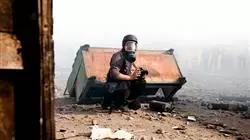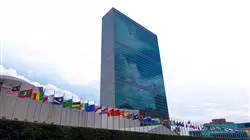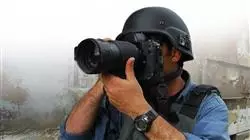University certificate
The world's largest faculty of journalism and communication”
Why study at TECH?
Professional journalists must provide truthful, objective and independent information. Only in this way will citizens be able to reliably know what is happening in the world”

Information is power and at the same time it is freedom, no one can freely choose what to believe or what to think if they have access to only part of the information. Therefore, the goal of international journalism must be to provide truthful, objective and independent information so that the citizens of the world can build informed and free opinions.
The Professional master’s degree in International Journalism offers specialized preparation with innovative, useful and concrete contents, essential for working in the international field. It offers up-to-date and competitive training with respect to other programs currently offered, thus training professionals who are prepared and capable of working and thriving in the media, in agencies or as freelance journalists.
A theoretical basis is fundamental for the specialization of any professional, but this Professional master’s degree does not focus strictly on theories or closed knowledge. TECH Professional master’s degree in International Journalism trains analytical, critical and reflective journalists, with a background that not only prepares them to inform, but also allows them to identify how and why certain situations occur in different societies around the world.
For this reason, TECH believes that it is not only relevant to stick to the study of international journalism, history or politics, but that it is necessary to delve into other disciplines that allow understanding why certain phenomena occur -whether political, social, legal or economic-, and that do not leave any blind spots in areas that an International Journalist must master.
This Professional master’s degree is a pioneer in its field, since it provides specialist training journalists in areas such as Law, Politics, Sociology and Economics, among other disciplines, which, in addition to informing, allows them to understand and interpret the different situations that take place in today's world. Furthermore, the 100% online format of the course allows the student to control their hours of study, without the inconvenience of traveling to an education center for classes.
This program will allow you to improve your skills and become a successful journalist”
This Professional master’s degree in International Journalism contains the most complete and up-to-date program on the university scene. The most important features include:
- Practical cases presented by experts in international journalism
- The graphic, schematic, and practical contents with which they are created provide scientific and practical information on the disciplines that are essential for professional practice
- Latest developments in international journalism
- Practical exercises where self-assessment can be used to improve learning
- A special emphasis on innovative methodologies in the field of the international journalism
- Algorithm-based interactive learning system for decision-making in situations focused on journalism and digital communication
- Theoretical lessons, questions to the expert, debate forums on controversial topics, and individual reflection assignments
- Content that is accessible from any fixed or portable device with an Internet connection
We provide you with the best training currently available in International Journalism. You only have to bring your enthusiasm to study”
The teaching staff includes professionals from the field of journalism who bring their experience to this training program, as well as renowned specialists from leading societies and prestigious universities.
The multimedia content, developed with the latest educational technology, will provide the professional with situated and contextual learning, i.e., a simulated environment that will provide an immersive training program designed to train in real situations.
This program is designed around Problem-Based Learning, whereby the professional must try to solve the different professional practice situations that arise throughout the program. For this purpose, the professional will be assisted by an innovative interactive video system created by renowned and experienced experts in International Journalism with extensive experience.
We offer you the best teaching methodology and a multitude of practical cases to simulate the real life situations that you could face throughout your career"

Know the latest trends in International Journalism and be the best in this sector"
Syllabus
The structure of the contents has been designed by a team of professionals in journalism and other related areas, who are conscious of the importance of up-to-date training in order to be able to deepen the area of knowledge, in order to produce work of professional quality through the use of the available tools.

We guarantee the most complete and up-to-date learning program on the market, which will allow you to enter an exciting world with every guarantee of success”
Module 1. Politics and Society
1.1. The Concept of Society in Philosophy
1.1.1. The Ideal Society of Aristotle
1.1.2. Plato’s Republic
1.1.3. Nietzsche's Freedom and Society
1.1.4. Rousseau’s Social Contract
1.1.5. Marxism of Karl Marx
1.1.6. Lenin’s Socialist Society
1.2. Elements of Politics
1.2.1. Structure of Politics
1.2.2. Population, Territory and Co-action
1.2.3. Forms of Participation in Politics
1.3. The Political System and Types of Government
1.3.1. Democracy
1.3.2. Tyranny
1.3.3. Oligarchy
1.3.4. Anarchy
1.3.5. Monarchy
1.3.6. Republic
1.3.7. Theocracy
1.3.8. Federations
1.3.9. Confederations
1.4. State and Sovereignty
1.4.1. What is Sovereignty?
1.4.2. Types of Sovereignty
1.4.3. Examples of Problems of Sovereignty
1.5. Functions and Organization of the Courts
1.5.1. Functions of the Courts
1.5.2. Organization the Courts
1.6. Political Attitudes and Political Cultures, Values and Ideologies
1.6.1. Political Cultures
1.6.2. Political Ideologies and Values
1.6.3. Political Attitudes and Their Evolution
1.7. Actors in Political Activity
1.7.1. Political Parties
1.7.2. Interest Groups
1.7.3. Social Movements
1.7.4. The media
1.8. Governance and the Factors of Change in Politics
1.8.1. Governance and Governability
1.8.2. Crisis of Governability
1.9. Capitalism and Democracy
1.9.1. Process of Change in the World
1.9.2. From Feudalism to Capitalism
1.9.3. The Bourgeois Revolution
1.9.4. Capitalism
1.10. Globalization
1.10.1. What is Globalization?
1.10.2. How do States Act in Global Contexts?
1.10.3. Negative Consequences of Globalization
Module 2. Sociology of International Relations
2.1. Fundamentals of Contemporary Sociology I
2.1.1. History of Sociology and Main Thinkers
2.1.2. Sociological Debate of Sociology
2.2. Fundamentals of Contemporary Sociology II
2.2.1. Contemporary Social Theory
2.2.2. Post-Modernism
2.2.3. Post-Colonialism, Eurocentric
2.2.4. Importance of History to Help Understand Current Conflicts
2.3. Sociology of International Relations
2.3.1. Concept of Power
2.3.2. Structure of Power in International Relations
2.4. Sociology of the Media I. Theoretical Introduction
2.4.1. Paradigms of Sociology in the Media
2.4.2. Modernity and Media
2.4.3. Networked Society
2.4.4. Panopticon and Surveillance
2.5. Sociology of of the Media II. The Role of the Media
2.5.1. Existence of the Social Problem and the Role of the Media
2.5.2. Example of Black Lives Matter
2.6. Sociology of of the Media III
2.6.1. Case Study How Did the Gulf War Not Happen? (Baudrillard)
2.6.2. The Virtual War and the Role of the Media
2.6.3. Spectacle and Propaganda
2.6.4. Real Cases. Conflict
2.7. The Sociology of Religion
2.7.1. The Religious Phenomenon
2.7.2. Religious Situation on a Global Level
2.8. Social Inequality
2.8.1. Ethnocentric
2.8.2. Institutional Racism
2.8.3. Intersectionality
2.8.4. Debates and Conflicts on the Topic
2.9. Migration
2.9.1. Models of Social Incorporation
2.9.2. Global Situation of Migration
2.9.3. Refugees
2.10. Regional Situations
2.10.1. Historical Contextualization and Regional Dynamics
2.10.2. Post-Communism in Eastern Countries
Module 3. International Law and Human Rights
3.1. History and Fundamentals of Human Rights
3.1.1. History of Human Rights
3.1.2. Fundamentals of Human Rights
3.1.3. Natural Rights
3.1.4. Ethical Constructivism
3.1.5. Contemporary Debates
3.2. Mechanisms of the Protection of Human Rights
3.2.1. Conventional Mechanisms
3.2.2. Non-Conventional Mechanisms
3.3. European and Inter-American Human Rights System
3.3.1. The European Union
3.3.2. European Convention
3.3.3. The European Court of Human Rights
3.3.4. History and Structure of the Inter-American System
3.4. African, Asian and Arab System of Human Rights
3.4.1. Human Rights System in Africa
3.4.2. Human Rights System in Asia and the Pacific
3.4.3. Arab Human Rights System
3.5. Politics, Globalization and Human Rights
3.5.1. External Action by States in the Field of Human Rights
3.5.2. Relationship Between Globalization and Human Rights
3.5.3. Multinationals and Human Rights
3.6. Public International Law
3.6.1. Legal System
3.6.2. Decentralization
3.6.3. International Law and its Effectiveness
3.7. History of Public International Law
3.7.1. Peace of Westphalia
3.7.2. Congress of Vienna
3.7.3. The Hague Conferences
3.7.4. Treaty of Versailles
3.7.5. United Nations Charter
3.8. Actors of International Law
3.8.1. Subjects of International Law
3.8.2. International Organizations
3.9. International Treaties
3.9.1. What are International Treaties?
3.9.2. Types of International Treaties
3.9.3. Phases of International Treaties
3.9.4. Reservations, Validity and Termination of International Treaties
3.9.5. Most Relevant International Treaties
3.10. The Deterioration of Human Rights. Violations of Human Rights
3.10.1. The Importance of Human Rights
3.10.2. How and Why Have Human Rights Deteriorated?
3.10.3. Violations of Human Rights
Module 4. International Politics by Geographical Zones I. Europe, North America and Latin America
4.1. Institutions of Power in the USA
4.1.1. Executive Power
4.1.2. Legislative Power
4.1.3. House of Representatives
4.1.4. Senate
4.1.5. Judicial Power
4.2. USA Electoral System
4.2.1. Presidential System
4.2.2. General Elections and Midterm Elections
4.2.3. Government Positions
4.3. USA and the World
4.3.1. United States and China
4.3.2. Relationship With Latin America
4.3.3. United States and the Middle East
4.3.4. United States and Europe
4.4. Creation of the European Union
4.4.1. Devastated Europe after World War II
4.4.2. From the Schuman Declaration to the Current EU
4.5. Institutions of the EU
4.5.1. Parliament
4.5.2. EU Council
4.5.3. The European Commission
4.5.4. Court
4.5.5. European Council
4.5.6. Court of Auditors
4.5.7. Central European Bank
4.5.8. Eurogroup
4.6. Is the European Union in Crisis?
4.6.1. Brexit
4.6.2. The Response to the 2008 Crisis, the Refugee Crisis and Coronavirus
4.6.3. EU and Turkey Relationships
4.6.4. The Far Right in Europe
4.7. Mexico and Central America
4.7.1. Mexico as a Latin American Power
4.7.2. Central America
4.7.3. Main Social Problems in Mexico and Central America
4.8. Andes Region. Venezuela, Colombia, Ecuador, Peru, Bolivia
4.8.1. The Venezuelan Crisis
4.8.2. Colombia
4.8.1.1. Guerrillas and Paramilitarism
4.8.1.2. Drug Trafficking
4.8.1.3. Assassinations of Social Leaders
4.8.3. Equator
4.8.3.1. The 2019 Uprisings in Ecuador
4.8.4. Peru
4.8.5. Bolivia
4.8.5.1. The Figure of Evo Morales
4.8.5.2. Current Political Context
4.9. Southern Cone Argentina, Chile, Brazil, Uruguay
4.9.1. Argentina, Once Again Plunged into Economic Crisis
4.9.2. Chile, Cradle of Latin American Neoliberalism
4.9.3. Brazil, the Economic Giant of the South
4.9.4. Uruguay, the Only Full Democracy in Latin America
4.10. The Big Challenges of Latin America
4.10.1. Inequality
4.10.2. Economic Dependence
4.10.3. Urbanization
4.10.4. Climate Change
4.10.5. Violence
4.10.6. Institutional Weakness
Module 5. International Politics by Geographical Zones II. Russia and the Former USSR, Asia and Africa
5.1. Russia
5.1.1. Fall of the USSR and Conversion to Capitalism
5.1.2. Putinism: 20 Years in Power
5.1.3. Russia's Allies
5.2. Caucasus and Central Asia
5.2.1. Nagorno Karabakh-Tension Between Armenia and Azerbaijan
5.2.2. Georgia, South Ossetia and Abkhazia
5.2.3. Central Asia, the Silk Road
5.3. Ukraine, Belarus and the Baltics
5.3.1. From Independence to Maidan: Ukraine
5.3.2. Belarus, 26 Years of Lukashenko's Rule
5.3.3. From the USSR to the EU: Baltic Countries
5.4. China
5.4.1. One Belt One Road
5.4.2. Market Communism
5.4.3. Chinese Hegemony
5.5. India
5.5.1. The Most Populated Democracy of the World
5.5.2. India-Pakistan Relationship
5.5.3. Hindu Nationalism
5.6. Far East
5.6.1. Japan, the Land of the Rising Sun
5.6.2. Korea, Between North and South
5.6.3. South East Asia: Vietnam, Indonesia, Singapore
5.7. Middle East
5.7.1. Saudi Arabia and the Gulf Countries
5.7.1. Iran, Regional Power
5.7.3. Israel
5.8. Maghreb
5.8.1. Egypt
5.8.2. Libya
5.8.3. Morocco and Algeria
5.9. Sub-Saharan Africa
5.9.1. Nigeria
5.9.2. Francophone Africa: Côte d'Ivoire, Burkina Faso
5.9.3. East Africa: Kenya, Tanzania
5.10. South Africa
5.10.1. End of Apartheid
5.10.2. Leadership in Africa
5.10.3. Inequality
Module 6. Practical Journalism in the Field of International Journalism
6.1. Materials
6.1.1. Technology
6.1.2. Mobile Journalism
6.2. Digital tools
6.2.1. Software
6.2.2. Redes sociales
6.3. Workplace Environment
6.3.1. Elections
6.3.2. Sporting Events
6.3.3. International Summits
6.4. Security/safety
6.4.1. Manifestations
6.4.2. Conflicts
6.5. Freelance Journalism
6.5.1. How to Work Freelance
6.5.2. Practical Information
6.6. Working in Asia and Russia
6.6.1. Asia
6.6.2. Russia
6.7. Working in Europe and the United States
6.7.1. Europe
6.7.2. United States
6.8. Working in Africa and Latin America
6.8.1. Africa:
6.8.2. Latin America
6.9. Ethical Journalism
6.9.1. Protection of Sources
6.9.2. Acquisition of Information
6.9.3. Stereotypes and Prejudices
6.10. international Journalism Applied to Written and Digital Media and Audiovisual Media
6.10.1. International Journalism Applied to Written and Digital Media
6.10.1.1. Online Journalism
6.10.1.2. Written Journalism
6.10.2. International Journalism Applied to Audiovisual Media
6.10.2.1. Radio
6.10.2.2. Television
Module 7. Conflict and Terrorism from the Perspective of International Journalism
7.1. Causes of Conflicts in Different Countries
7.1.1. Economy
7.1.2. Social
7.1.3. Politics
7.1.4. Territorial
7.2. Types of Conflicts
7.2.1. Intra-State
7.2.2. Inter-State
7.3. Conflicts That Have Marked a Before and After
7.3.1. Cold War
7.3.1.1. Division of Germany
7.3.1.2. The Vietnam War
7.3.1.3. Korean War
7.3.1.4. Cuban Missile Crisis
7.3.2. Revolutions that Changed History
7.3.2.1. French Revolution
7.3.2.2. Russian Revolution
7.3.2.3. Cuban Revolution
7.3.2.4. Arab Spring
7.3.2.5. Chinese Revolution
7.3.2.6. North American Revolution
7.3.3. Religious
7.3.3.1. Holy War
7.3.3.2. The 30 Years War
7.3.3.3. French Religious Wars
7.4. The Evolution of Conflicts
7.4.1. Sun Tzu
7.4.2. Thucydides
7.4.3. Julio Cesar
7.4.4. Karl von Clausewitz
7.4.5. Gastón Bouthoul
7.4.6. John Frederick Charles Fuller
7.4.7. Raymond Aron
7.5. Consequences of Armed Conflicts
7.5.1. Physical Destruction
7.5.2. Economic Crisis
7.5.3. Political Crisis
7.5.4. Environmental Crisis
7.5.5. Psychological Results
7.6. Terrorism
7.6.1. Causes and Types of Terrorism
7.6.1.1. Politics
7.6.1.2. Economics
7.6.1.3. Stray
7.6.1.4. Of the State
7.6.1.5. Ecological
7.6.1.6. Bioterrorism
7.6.1.7. Cyberterrorism
7.6.2. Conversion Process to Terrorism
7.6.3. New Forms of Terrorism
7.7. Nationalism and Extremism
7.7.1. Causes of Extremism
7.8. Hate Speech and Technology
7.8.1. Causes of Extremism
7.8.2. What is Hate Speech and How is it Constructed?
7.8.3. Relationship Between Technology, Hate Speech and Extremism
7.9. International Interventionism
7.9.1. United Nations
7.9.2. NATO
7.10. War Journalism
7.10.1. Preparation and Training of Journalists in Hostile Environments
7.10.1.1. The Fragility of a Freelance Journalist in Conflicts
7.10.1.2. Safety Manual for Journalists in Risk Zones
7.10.2. Rights and Responsibilities of the Journalist
7.10.2.1. War Journalists
Module 8. International Economy
8.1. Important Concepts in Economy
8.1.1. Economics as a Science, Principles and Functions.
8.1.2. Macroeconomic Magnitudes
8.1.3. Costs
8.2. The demand
8.2.1. Fundamentals
8.2.2. Modeling
8.3. The Offer
8.3.1. Fundamentals
8.3.2. Modeling
8.4. Balance Between Demand and Offer
8.4.1. Point of Balance and Interpretation
8.4.2. Effects of Externalities on the Market
8.5. IS-LM-BP Model
8.5.1. Goods and Services Market and the IS Curve
8.5.2. Monetary Market and the LM Curve
8.5.3. Foreign Trade (BP)
8.6. Tax System
8.6.1. Concepts: Type of Taxes, Characteristics of a Tax System
8.6.2. Organization of the Spanish Tax Authorities
8.6.3. Analysis of the Spanish Tax System
8.7. The European Union - Economic Evolution of the Member Countries
8.7.1. History and Creation of the European Union
8.7.2. Structure and Functioning of the European Union
8.7.3. Analysis and Economic Evolution of the Member Countries
8.8. Global Economic Organization
8.8.1. Monetary and Financial System
8.8.2. International Economic Relations
8.8.3. International Institutions
8.9. Contemporary World Economic History
8.9.1. First and Second Petrol Crisis
8.9.2. The Dot Com Bubble
8.9.3. Global Financial Crisis
8.9.4. European Sovereign Debt Crisis
8.10. Current Economic Context
8.10.1. Current Economic Developments and Future Prospects
8.10.2. Industry 4.0 and Repercussion on the Economics
Module 9. Investigative Journalism and Narrative Journalism in International Journalism
9.1. History of International Investigative Journalism
9.1.1. What is the Investigative Journalism?
9.1.2. Big International Investigative Journalists
9.1.3. Examples of International Investigations
9.1.3.1. The Case of the Church in the Boston Globe
9.1.3.2. The Nixon Case
9.1.3.3. The Discovery of the Gulag
9.2. International Investigative Journalism Techniques
9.2.1. Searching for a Topic
9.2.2. How to Obtain Documentation
9.2.3. Verify the Information
9.3. Information Sources
9.3.1. Type of Sources
9.3.1.1. Document Sources
9.3.1.2. Personal Sources
9.3.1.3. Offical Sources
9.4. Challenges of International Investigative Journalism
9.4.1. Security/safety
9.4.2. Protecting the Sources
9.5. The Interview, Key for a Good Investigative Report
9.5.1. Features
9.5.2. Types of Interviews
9.5.3. Methodology
9.6. History of the International Narrative Journalism
9.6.1. What is the Narrative Journalism?
9.6.2. New Journalism
9.6.3. Gonzo Journalism
9.6.4. The Fathers of International Narrative Journalism
9.6.4.1. Hunter Thompson
9.6.4.2. Tom Wolfe
9.6.4.3. Truman Capote
9.6.4.4. Norman Mailer
9.6.4.5. Rodolfo Walsh
9.6.4.6. Tomás Eloy Martínez
9.7. The Profile and the International Press Reports
9.7.1. Profile: Characteristics and Examples
9.7.2. The Press. Characteristics and Examples
9.8. How to Tell Stories in the International Field
9.8.1. The Importance of Scenes
9.8.2. The Rhythm
9.8.3. The Language
9.9. Slow-Burning International Journalism
9.9.1. Showing and Telling
9.9.2. The Use of the First Person
9.9.3. The Look
9.9.4. Self-Editing
9.9.5. Methodology
9.10. International Press Reports
9.10.1. Great Journalistic Reports
9.10.1.1. Cold Blooded, Truman Capote
9.10.1.2. Operation Massacre, Rodolfo Walsh
9.10.1.3. Voices of Chernobyl, Svetlana Aleksiévich
9.10.2. Great Current Journalists
9.10.2.1. Martín Caparrós
9.10.2.2. Leila Guerriero
9.10.2.3. Agus Morales
9.10.3. Media Dedicated to Narrative Journalism
9.10.3.1. Gatopardo
9.10.3.2. 5W
9.10.3.3. Soho
Module 10. International Journalism and Professional Ethics
10.1. International Media. Media vs. Agencies
10.1.1. Main International Media
10.1.2. In What Way Does The Media Inform and What Influence Does it Have?
10.2. Preproduction
10.2.1. How to Plan a Report
10.2.2. What to Include
10.2.3. The Figure of the Fixer
10.3. Information Sources
10.3.1. International Organizations
10.3.2. Chancelleries
10.3.3. Embassies
10.3.4. Government
10.3.5. Agency and Communication Media
10.3.6. Correspondents
10.3.7. Experts
10.4. Verification of Data and Fake News
10.4.1. Types of Verification
10.4.1.1. Sources
10.4.1.2. Images
10.4.1.3. Dates
10.4.1.4. Origin
10.4.2. Criteria to Contrast Fake News
10.5. International Journalist Profiles
10.5.1. Correspondents
10.5.2. Special Reports
10.5.3. Analyst
10.5.4. Freelance Journalist
10.6. Journalistic Genres
10.6.1. Informative
10.6.2. Opinion
10.7. Audiovisual and Press Journalism
10.7.1. Photo Journalism
10.7.2. Audiovisual Journalism
10.7.3. Written Press (Paper and Digital Newspapers)
10.7.4. Radio
10.8. Setting Agendas and Selling Topics to the Media
10.8.1. International Newsworthiness Criteria
10.8.2. How Media Agendas Work
10.8.3. Sell International Topics to the Media
10.9. Trends and Ethical Journalism
10.9.1. What is the Subject and Why?
10.9.2. Tendency Towards Conflict
10.9.3. Ethical Journalism
10.10. Technology International Context
10.10.1. Leaked Documents from the Wikileaks Case
10.10.2. Influence Campaigns (Cambridge Analytica), Disinformation, Censorship, etc.).

A unique, key, and decisive training experience to boost your professional development”
/h1> Professional Master's Degree in International Journalism .
In our Professional Master's Degree in International Journalism we offer the best existing qualification in investigative practice, reporting, writing and other aspects of the communication field. This TECH Global University program was designed by specialists in the field, thanks to this we have a sophisticated curriculum that will give you an analytical, critical and reflective look to competently address the various news events that arise in the day to day. On the other hand, upon graduation you will get a novel conceptual background, which will serve to understand the functioning of each human rights system according to the geographical area to which it belongs, so that you can analyze them correctly according to their cultural traditions and history.
Postgraduate in International Journalism 100% online
.
Technological innovation imposed new challenges for journalism, as the demand for constant information requires professionals to be prepared to create accurate and high quality content. In TECH we want to offer cutting-edge training, so in this program of 1,500 academic hours students have the opportunity to properly qualify in the following topics: political structure, society, sociology of international relations and economics of the regions, among other content of great educational value. On the other hand, our 100% online modality allows us to offer students the benefits of time and space, which are of great help in planning their daily activities.







